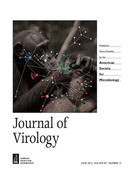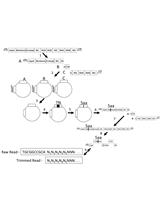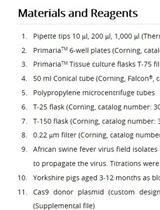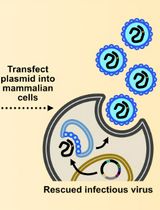- EN - English
- CN - 中文
Colony Forming Assay for HCV-Replicon Cell Line
丙肝病毒复制子细胞系德尔集落形成分析法
发布: 2013年12月20日第3卷第24期 DOI: 10.21769/BioProtoc.1009 浏览次数: 9960
评审: Anonymous reviewer(s)
Abstract
Hepatitis C virus (HCV) is the main causative agent of chronic hepatitis, liver cirrhosis, and hepatocellular carcinoma. Since the HCV genome is present exclusively in RNA form during replication, a number of anti-HCV drugs show appearance of rapid drug-resistant viruses. Therefore, it is important to test generation of drug-escape mutant viruses by developed antiviral drugs for their validity. Here, we describe a colony formation assay-based method to observe appearance of drug-resistant viruses against nucleic acid based anti-HCV drugs in genotype 1b based subgenomic replicon cell culture system (Lee et al., 2013).
Keywords: HEPATITIS C VIRUS (丙型肝炎病毒)Materials and Reagents
- Cell line: HCV-replicon Huh-7 human hepatoma cell line (HCV genotype 1b subgenomic replicon pFKI389neo/NS3–3’/5.1 containing the neomycin resistant gene, provided by R. Bartenschlager, Heidelberg University, German) (Lohmann et al., 1999; Krieger et al., 2001)
- 0.1% Trypsin-EDTA (WELGENE, catalog number: LS015-01 )
- Fetal Bovine Serum (FBS) (Thermo Fisher Scientific, HycloneTM, catalog number: SH30919.03 )
- 100x Penicillin/Streptomycin solution (Thermo Fisher Scientific, HycloneTM, catalog number: 3V30010 )
- Lipofectamine 2000 (Life Technology, catalog number: 11668-019 )
- NaCl (Sigma-Aldrich, catalog number: S5886 )
- KCl (Sigma-Aldrich, catalog number: P5405 )
- Na2HPO4 (Sigma-Aldrich, catalog number: S3264 )
- KH2PO4 (Sigma-Aldrich, catalog number: P9791 )
- NaOH (Sigma-Aldrich, catalog number: S5881 )
- 1x Phosphate Buffered Saline (PBS) (see Recipes)
- Complete Dulbecco’s modified Eagle medium with high glucose (DMEM) (Thermo Fisher Scientific, HycloneTM, catalog number: SH30243.01 ) (see Recipes)
- 50 mg/ml G418 (Merck KGaA, catalog number: 345810 ) (see Recipes)
- 2% Paraformaldehyde solution (Sigma-Aldrich, catalog number: 158127 ) (see Recipes)
- 1% Methylene blue (Duksan Scientific, catalog number: MEE0-22002 ) (see Recipes)
Equipment
- 35 mm cell culture plate (Corning, catalog number: 430165 )
- 100 mm cell culture plate (BD Bioscience, catalog number: 353003 )
- 5% CO2, 37 °C Incubator (Thermo Fisher Scientific, catalog number: 311 )
Procedure
文章信息
版权信息
© 2013 The Authors; exclusive licensee Bio-protocol LLC.
如何引用
Lee, C. H. and Lee, S. (2013). Colony Forming Assay for HCV-Replicon Cell Line. Bio-protocol 3(24): e1009. DOI: 10.21769/BioProtoc.1009.
分类
微生物学 > 微生物遗传学 > 诱/突变
微生物学 > 微生物细胞生物学 > 细胞活力
您对这篇实验方法有问题吗?
在此处发布您的问题,我们将邀请本文作者来回答。同时,我们会将您的问题发布到Bio-protocol Exchange,以便寻求社区成员的帮助。
Share
Bluesky
X
Copy link















